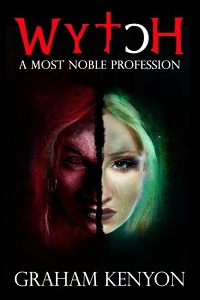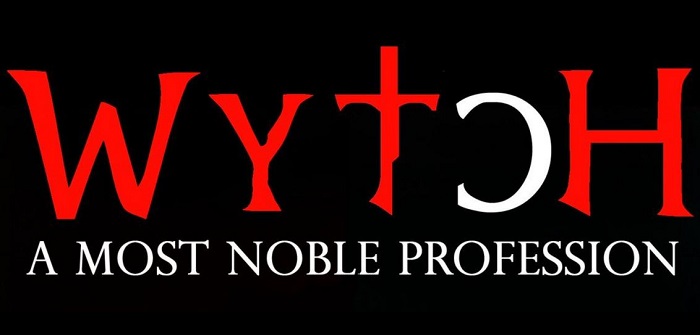By the pricking of my thumbs, something wicked this way comes.
Shakespeare used this line to introduce his fabled triumvirate of hags in his seminal Macbeth, so it is only fitting it be used here to introduce Graham Kenyon’s novel. However unlike the witches of Shakespeare’s play, those in Kenyon’s book play more than a passing role.
You see, something is rotten in the olde English town of Faerburn. Built upon sour ground, the town has been the location for a myriad of slaughters from pre-history on. From pagans and Romans, to ancient witches and magical battles, the number one mystery of this book is why anyone built a town there in the first place, with the second being why on earth they stuck around afterwards.
 Be that as it may, the story opens in the Year of Our Lord 1408 and we are introduced to the first wytch, Annabelle, as she performs a caesarean section on a local woman. No sooner has she done so than the narrative jumps to the first of the innumerable flashbacks that pepper the book, taking us out of the action to explain a point or two, in this case that Annabelle has twins, one of which is something and the other is not. Don’t worry if you’re unclear, all will be revealed a few flashbacks on.
Be that as it may, the story opens in the Year of Our Lord 1408 and we are introduced to the first wytch, Annabelle, as she performs a caesarean section on a local woman. No sooner has she done so than the narrative jumps to the first of the innumerable flashbacks that pepper the book, taking us out of the action to explain a point or two, in this case that Annabelle has twins, one of which is something and the other is not. Don’t worry if you’re unclear, all will be revealed a few flashbacks on.
The twins, Rose and Agnes, grow up to become wytches themselves, and while they do so we are exposed to the secret history of Faerburn, a history that includes secret societies, god-like protectors and scoundrels. Unfortunately, these all seem to be revealed precisely as the plot demands it, which grows increasingly tiresome. Deus ex machina are all very well, but when they arrive with the punctuality of the German train system it gets hard to sustain any sense of meaningful conflict.
There is a good story here, the characters are well drawn and the reader will find themselves drawn in despite the rambling narrative and the general purposelessness of a plot that meanders on every zephyr of the author’s whim like a rudderless dirigible. Anachronisms abound, like the aforementioned tea-drinking to the smoking of pipes.
Kenyon seems to enjoy the drama of the sweeping statement which range from the clairvoyant “Rose wore a white dress when she left the barn that day, yet when she dismounted it was black – and many years went by before she was seen wearing any other colour” to the ridiculous “she turned into a scorpion, sighed, then raised her hands to the sun.” The book does not cover ‘many years’ (it barely covers one, excepting the flashbacks), and scorpions don’t have hands.
Several of these sweeping statements go unexplained towards the end, as it becomes obvious the book is a prequel to one set in the 20th century. It might be a good idea to read the other one first. You might find yourself less lost.
Several themes are explored through the book including revenge, the role of women healers in medieval society, the role of the church in childbirth, and how an entire town can completely ignore a dark, looming, forbidding castle that is right next door.
Wytch, by Graham Kenyon cries out time and time again for a decent edit. It could be fantastic. Instead it only achieves despite itself.
Reviewed by DC White
Rating out of 10: 5
Release Date: December 2015
Available in paperback or eBook from Amazon




















